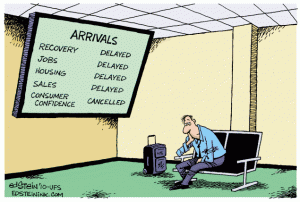 To the Obama-haters at the Wall Street Journal, the stubborn economic slowdown reflects business’ fear of looming tax hikes. The Administration-friendly folks at the New York Times, by contrast, blame the lackluster economy on political stalemate in Washington. Meantime, over at Bloomberg Businessweek, they tell us it’s all a matter of us having our cake and eating it, too — loving both the Bush-era low taxes and Obama-era high spending and failing to choose between the two.
To the Obama-haters at the Wall Street Journal, the stubborn economic slowdown reflects business’ fear of looming tax hikes. The Administration-friendly folks at the New York Times, by contrast, blame the lackluster economy on political stalemate in Washington. Meantime, over at Bloomberg Businessweek, they tell us it’s all a matter of us having our cake and eating it, too — loving both the Bush-era low taxes and Obama-era high spending and failing to choose between the two.
The inability of our economy to surge back consistently from the Great Recession has become a Rorschach test for pundits. They look at the ugly blot and discern a pattern, one that – not surprisingly – reflects their biases. Love small government and Bush-era tax cuts? Obama’s overreaching is to blame for our woes. Never met a problem that more money from Washington couldn’t solve? It’s the shortfall in such largesse that is making that blot so skinny. And if they can’t make up their minds, they blame both Bush-era “wisdom and folly” – whatever that fence-straddling phrase means.
For my money, the reality is more a matter of the Depression-era notion of pushing on a string. Our policymakers can’t find the levers that will kickstart the economy, that will ignite the animal spirits of our business leaders, and that will drive down the pathologically high unemployment rate. Nothing seems to work, though the folks at the Fed aim to keep pushing whatever buttons they can. Their newest tack, revealed on Aug. 10: buying up more Treasury debt to keep interest rates low.
 In the end, the problem may be that the hole we put ourselves into in the Great Recession is just depressingly deep. It took years to dig. And it could take years, sadly, for us to find our way out. To take just one measure, U.S. employment plunged by more than six percent in the recession that began in 2007, the steepest fall of any of the 11 recessions we’ve suffered through since World War II. To take another measure, these downturns lasted from six to 16 months, and our latest slide – believed to have ended in 2009, though the National Bureau of Economic Research has yet to date it – will almost certainly prove to be longer than any of them. (For policy wonks, the Minneapolis Fed puts all these comparisons into perspective here.)
In the end, the problem may be that the hole we put ourselves into in the Great Recession is just depressingly deep. It took years to dig. And it could take years, sadly, for us to find our way out. To take just one measure, U.S. employment plunged by more than six percent in the recession that began in 2007, the steepest fall of any of the 11 recessions we’ve suffered through since World War II. To take another measure, these downturns lasted from six to 16 months, and our latest slide – believed to have ended in 2009, though the National Bureau of Economic Research has yet to date it – will almost certainly prove to be longer than any of them. (For policy wonks, the Minneapolis Fed puts all these comparisons into perspective here.)
If history proves anything, however, it’s that economies do claw their way back. Sometimes, they do so with the help of Washington. Sometimes, they move on despite government meddling, however well-intentioned. Even today, economists don’t agree on whether D.C. pulled us out of the Depression or prolonged it – making that bout of global misery our first and biggest political and economic Rorschach test.
It’s no comfort to people who have been out of work for months or even years at this point. It’s also small comfort to investors or people considering whether to deploy capital, especially since they are still sussing out Washington’s new regulatory reach. And, if this downturn proves at all similar to earlier ones, whole industries will emerge reshaped as a result of it (think Detroit), not to mention companies (think GM). We will come out of this as a far different economy with areas like Internet-related industries taking a dominant place over the manufacturing icons of the past. (How is it that people still have enough money for iPads?)
Following every twist and turn in this uneven recovery is enough to generate serious palpitations. For players in the capital markets – or anyone, for that matter — it’s healthier to set aside the dire headlines of the moment and keep your eyes on the horizon, however distant it seems. Bet on a long slow ride up, with lots of dips. Keynes famously said that in the long run, we are all dead. But at the moment, the promise of the long run is the only thing we have to hang onto.
